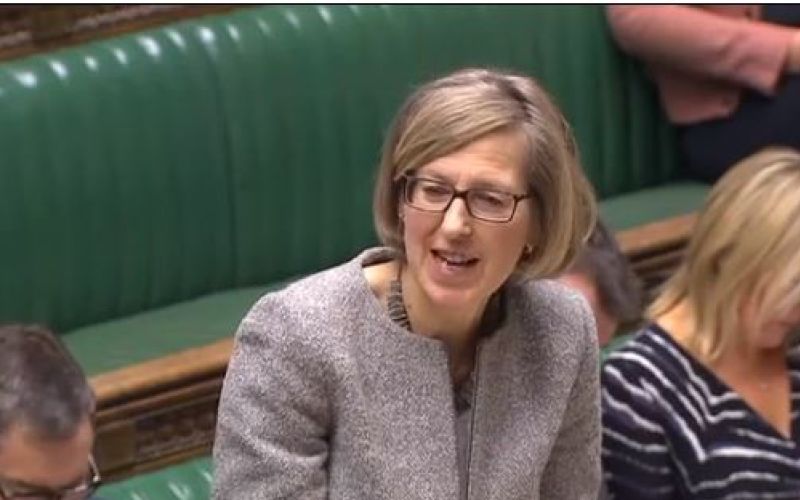Campaigners have raised serious concerns about government plans to video-record all face-to-face assessments for personal independence payment (PIP).
The move, which will begin with a pilot project, before being rolled out across the country, was announced this week by the minister for disabled people, Sarah Newton.
Newton also announced that the government was planning to extend the contracts of the two discredited companies that carry out the assessments – Capita and Atos – by another two years (see separate story).
Newton (pictured) said the Department for Work and Pensions (DWP) would pilot the video-recording of PIP assessments, with a plan to roll this out across the country as “a standard part of the process”.
Claimants can already request an audio recording of their PIP assessment, but they need to provide the expensive equipment themselves, and requests are still sometimes rejected.
Newton had already told the Commons work and pensions committee that DWP intended to make “recording the PIP assessment a standard part of the process” but had suggested that video recording was just one potential option.
A DWP spokeswoman said yesterday (Wednesday) that the actions it had taken this week “show our absolute commitment to improving the service we offer to claimants across the whole PIP journey, alongside promoting transparency and trust”.
But Buckinghamshire Disability Service (BuDS) said on its Facebook page that “for DWP to admit that video recording of the assessment is needed is a shocking admission that you can’t believe what the assessors write”.
In February, a report by the work and pensions committee found the PIP and employment and support allowance assessment systems were being undermined by a “pervasive culture of mistrust”, fuelled by widespread claims that assessors were deliberately trying to prevent disabled people receiving the support they were entitled to.
Evidence submitted to the committee by thousands of claimants had substantiated a major investigation by Disability News Service (DNS) into the dishonesty of PIP assessors employed by Atos and Capita.
Further DNS reports this February – based on freedom of information data released by DWP to campaigner John Slater – revealed “shocking” failings by the two companies in how they were fulfilling their contracts.
Slater said this week that the announcement on video-recording “appears to be good news and hopefully will solve the problem of inaccurate medical reports and bad decisions”.
But he said he had concerns about confidentiality, particularly around how the videos would be stored, who would be allowed to access them and what DWP would be able to use them for.
He said that current guidance states that assessors cannot use information in their report that has been told to them in confidence during a PIP assessment.
But the current consent form for audio recordings says that “DWP may request a copy of the recording at any time”, without the form saying who at DWP and for what purpose.
If that was not “tightened up considerably” there could be serious breaches of confidentiality with video-recording of assessments, he said.
Claimants often reveal deeply sensitive information in their assessments, for example that they have been abused.
Slater said that “consent needs to be clear about what people are agreeing to” and “asking people to allow the DWP to do whatever it wants with recordings isn’t good enough in my view”.
He has previously questioned DWP about what happens to copies of audio recordings and who can request to see them but was told the department “didn’t keep records of why copies were requested and what happened to them afterwards”.
Ken Butler, welfare benefits adviser at Disability Rights UK, said the video recording announcement was “unexpected”.
He also had questions about how it would work.
He said: “It raises more questions than answers – will all parts of an examination be videoed? Will videoing be compulsory, or can a disabled person ask to opt-out? Will home visits be recorded? Will copies of videoed assessments be automatically given to claimants?
“Some disabled people may not be happy to be video recorded.”
He added: “It’s not clear why the option to audio record PIP assessments has not been introduced instead.
“This might be acceptable to more disabled people and be easier to introduce more quickly.
“For example, we were told by Capita when it took over the PIP contract that it had the immediate ability to audio record all its assessments, including home visits.”

 Disabled MP who quit government over benefit cuts tells DNS: ‘The consequences will be devastating’
Disabled MP who quit government over benefit cuts tells DNS: ‘The consequences will be devastating’ Minister finally admits that working-age benefits spending is stable, despite months of ‘spiralling’ claims
Minister finally admits that working-age benefits spending is stable, despite months of ‘spiralling’ claims This bill opens the door to scandal, abuse and injustice, disabled activists say after assisted dying bill vote
This bill opens the door to scandal, abuse and injustice, disabled activists say after assisted dying bill vote